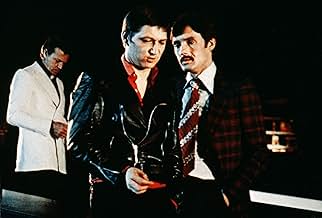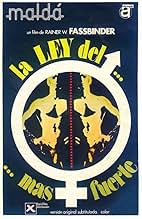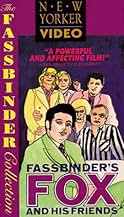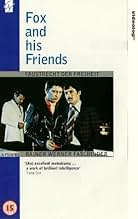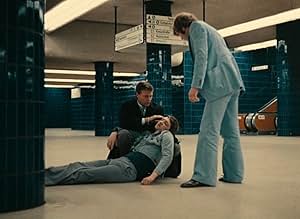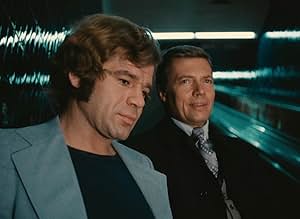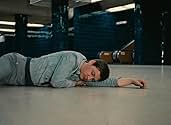IMDb-BEWERTUNG
7,6/10
7335
IHRE BEWERTUNG
Ein junger westdeutscher Arbeiter gewinnt in der Lotterie und beginnt eine Beziehung zu einem Mann über seiner gesellschaftlichen Stellung.Ein junger westdeutscher Arbeiter gewinnt in der Lotterie und beginnt eine Beziehung zu einem Mann über seiner gesellschaftlichen Stellung.Ein junger westdeutscher Arbeiter gewinnt in der Lotterie und beginnt eine Beziehung zu einem Mann über seiner gesellschaftlichen Stellung.
- Regie
- Drehbuch
- Hauptbesetzung
- Auszeichnungen
- 1 wins total
Karlheinz Böhm
- Max
- (as Karl-Heinz Böhm)
Harry Baer
- Philip
- (as Harry Bär)
Karl-Heinz Staudenmeyer
- Krapp
- (as Karl Heinz Staudenmeier)
Marquard Bohm
- American Soldier
- (as Marquart Bohm)
Empfohlene Bewertungen
The ironically titled Fox and His Friends, Fassbinder's rather excellent study of a none-too-bright circus worker who wins a small fortune in the lottery, is a touching film that features a great performance from Fassbinder himself in the title role. A reflection on the class system and homosexual relationships of 1970's Germany, Fox and His Friends is unsentimental and guileless most of the time. Fox (Fassbinder) is one of the main attractions of a circus like festival, with his lover being arrested for tax fraud. Fox somehow knows he'll win the lottery, so when he picks up a wealthy man at the local 'pick-up toilets', Fox makes sure he reaches the store in time to lodge his ticket. Cut to Fox celebrating his 500 000 marks win, he's drinking in his usual tavern with the effete bar staff and clientele. Fox then somehow becomes involved with a somewhat arrogant and pretentious man, already in a relationship, who takes the naïve Fox for a ride, spending his money in selfish and extravagant ways. Fassbinder's melodrama is droll and poignant, with a tragically ironic ending. Oh, and you have to give extra marks to a director who inserts lengthy nude scenes of themselves in their films.
"Faustrecht der Freiheit" occupies a valued place in my video collection. I find myself returning to it again and again, thoroughly enjoying Fassbinder's talent, which run throughout the film. Perceptive, witty and challenging, this drama provides astute observations on societal motivations, political aspirations and, above all, human nature.
The main point of Fox and his Friends seems to be that money corrupts the chances of meaningful human interaction; and the movie has a lot more going for it, there's a deep aesthetic richness, quality of textual reference, and it has the pulse of relationships.
Franz aka Fox is a circus entertainer who wins the lottery and is then fleeced by those whose love he aspires to.
I found myself admiring Fassbinder and Ballhaus' homages to Sternberg, taking the slatted light of Mogador (Morocco - 1930) and pouring colour in, so that the Moroccan street looks like late Bridget Riley. Following on from Welt am draht two years earlier another of Dietrich's iconic moments under Sternberg's gaze is referenced (Dishonored in Welt am draht, Shanghai Express here), pallid mockeries full of weltschmerz (weltschmerz heaped on weltschmerz), a sense that life might be better.
It's quite easy to get carried away with the design, to see the movie as a parade of yellow dresses and peach-coloured flowers. There's a relentless gay aesthetic, for example Eugen, the dandy entrepreneur who grifts fox, has a poster for The Prince of Homburg in his flat, the ambisexual play by high-strung Heinrich von Kleist, whose search for the ideal, seems to govern Eugen's private life. Eugen is an unpleasant man, there's a brilliant shot of him looking through a spyhole, keeping his distance from his waiting lover, coolly observing.
Franz has panic attacks in the movie, a good touch I thought, that's what unrequited love does to you. Aesthetically the best of Fassbinder's movies that I've seen. Gods of the Plague touches it out in terms of successful content.
Franz aka Fox is a circus entertainer who wins the lottery and is then fleeced by those whose love he aspires to.
I found myself admiring Fassbinder and Ballhaus' homages to Sternberg, taking the slatted light of Mogador (Morocco - 1930) and pouring colour in, so that the Moroccan street looks like late Bridget Riley. Following on from Welt am draht two years earlier another of Dietrich's iconic moments under Sternberg's gaze is referenced (Dishonored in Welt am draht, Shanghai Express here), pallid mockeries full of weltschmerz (weltschmerz heaped on weltschmerz), a sense that life might be better.
It's quite easy to get carried away with the design, to see the movie as a parade of yellow dresses and peach-coloured flowers. There's a relentless gay aesthetic, for example Eugen, the dandy entrepreneur who grifts fox, has a poster for The Prince of Homburg in his flat, the ambisexual play by high-strung Heinrich von Kleist, whose search for the ideal, seems to govern Eugen's private life. Eugen is an unpleasant man, there's a brilliant shot of him looking through a spyhole, keeping his distance from his waiting lover, coolly observing.
Franz has panic attacks in the movie, a good touch I thought, that's what unrequited love does to you. Aesthetically the best of Fassbinder's movies that I've seen. Gods of the Plague touches it out in terms of successful content.
In "Fox and His Friends" (1975) which Rainer Werner Fassbinder wrote and directed, he played a main character, Franz Bieberkopf alias "Fox", a lower class, uneducated circus worker who loses his job when his lover, the circus owner is arrested and sent to prison for tax fraud. Fox believes in his luck and strikes it rich by winning 500,000 marks in the lottery and very soon attracts the attention of an elegant, posh, and sophisticated Eugen who knows very well how to make Fox pay for his expensive habits and how to make him invest a lot of money in his father business that is not very successful to say the least. What fascinated me the most - how convincingly Fassbinder - one man production company who came up with the idea, wrote the screenplay and directed the movie- played seemingly tough but as it turned, confused and vulnerable Fox. Another interesting aspect of the movie is the way Fassbinder describes the gay community in Germany of the early 70s. He does not make any excuses and he does not make his characters complete villains or innocent victims. The story he tells could've happened in any community.
A powerful and harrowing melodrama and one of Fassbinder's most accessible movies,this is a must-see for all those interested in intelligent filmmaking.The tragic story of Fox is masterfully and poignantly handled by Fassbinder, while never slipping into sloppy sentimentality.At the same time the film explores sexual and political issues that are still very much relevant.
Wusstest du schon
- WissenswertesThe normally overweight Rainer Werner Fassbinder dieted strenuously to lose weight in order to play the role of Fox, which included a full-frontal nude scene.
- PatzerOne character mentions that one could receive money from the city for collecting June bugs (May beetles, genus Phyllophaga) as children. In reality, children were paid for collecting Colorado potato beetles (Leptinotarsa decemlineata), an invasive species.
Top-Auswahl
Melde dich zum Bewerten an und greife auf die Watchlist für personalisierte Empfehlungen zu.
- How long is Fox and His Friends?Powered by Alexa
Details
- Erscheinungsdatum
- Herkunftsland
- Offizielle Standorte
- Sprachen
- Auch bekannt als
- La ley del más fuerte
- Drehorte
- Petersplatz, München, Bayern, Deutschland(clock tower)
- Produktionsfirmen
- Weitere beteiligte Unternehmen bei IMDbPro anzeigen
Box Office
- Budget
- 450.000 DM (geschätzt)
- Bruttoertrag in den USA und Kanada
- 8.144 $
- Eröffnungswochenende in den USA und in Kanada
- 11.623 $
- 16. Feb. 2003
- Weltweiter Bruttoertrag
- 8.158 $
- Laufzeit
- 2 Std. 4 Min.(124 min)
- Sound-Mix
- Seitenverhältnis
- 1.37 : 1
Zu dieser Seite beitragen
Bearbeitung vorschlagen oder fehlenden Inhalt hinzufügen

